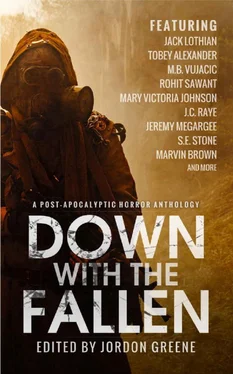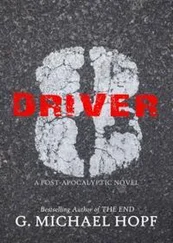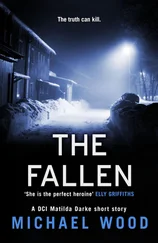Juli was standing a few steps away from the counter, screaming her head off. Behind the counter, a faceless figure caked with blood and stinking of death swayed slightly when it got to its feet and lurched toward Juli. The countertop stopped it.
“Juli!” Haley yelled and got moving. She rushed to her daughter, who was standing there as if she had been planted, screaming and screaming, and screaming. She grabbed the girl’s hand and pulled her to the door, glancing in passing to the dead, faceless girl who had just found where the countertop ended.
Mother and daughter ran out of the store and Haley slammed the door shut, unsure how much good this would do but incapable of coming up with a better idea. The first few steps she had to drag Juli along but now the girl was running on her own. They crossed the road and went around the dilapidated house that marked the beginning of the town. Its backyard was shaded by a huge oak tree. Haley pulled her daughter behind its trunk and sagged down to the ground. She couldn’t run any farther. She couldn’t even walk right now.
“What was that, Mom?” Juli said, her voice quavering, her face as white as the snow that used to cover their own backyard every October. “Was it dead?”
“Yes,” Haley said. There was no way anyone could survive two or more shots to the head.
“Was it a zombie?”
“Zombies are in the movies, Juli,” Haley said. She hated zombie movies. She hated all the supernatural movies, actually, zombies, vampires, the lot. And now one such movie was unfolding right here, in real life.
“So what was it, then?” the girl insisted, a little belligerent, a little agitated, still shaking in her mother’s arms.
“I don’t know,” Haley sighed. She didn’t add that there may be more like it. There were bound to be more like it. But Juli could figure this out for herself.
“What are we going to do now?”
“We’re going to stay put,” her mother said. She wasn’t afraid anymore. She was too exhausted to be afraid. “We can spend the night here. Then we’ll figure it out tomorrow.”
“You think it’s safe?” Juli asked, incredulous.
“No, Juli,” she said. “Nowhere is safe, but it’s a bit better here than trying the house. We can run if something—that thing—comes this way. I can’t fight right now and I need some rest before we move on.”
“I know,” the girl said softly. “I’m sorry.”
Haley thought she actually heard her heart snap. She had a pretty good idea what she would do, right after Juli went to sleep. Walking corpses were just too much. She wasn’t going to live in a horror movie and she wasn’t going to let her daughter live in one, either. Haley had a knife that Juli didn’t know about, a pocket one, and she was going to put it to good use later this night.
“It’s okay, honey,” she said, pulling her daughter into her lap. “It’s okay.”
Men of Tomorrow
Jack Lothian
After all the death and destruction, all the blood and horror, it comes down to this: five men with kitbags and weapons, shivering in the cold, making their way up a snowy trail, through the dark winter woods, on their way to face a god. It’s a futile gesture in the face of humanity’s last gleaming. We’re going to die and it’s probably going to be very painful.
He knows we’re coming, of course. It would be naive to think otherwise. He can hear every step, every frosted breath. Sergeant O’Reilly claims to have seen a dark shape hovering over us as we passed Mount Healy, but we’re tired and hungry and have suffered so many losses that it’s hard to trust our senses anymore. We’re like a boxer staggering off the ropes, raising our gloves for a final desperate assault, even though the canvas is lurching toward us with every weary step.
Then we all stop walking, one by one, staring off through the branches and leaves. We can see it in the distance now, glowing in the night. A giant structure of ice, towering up into the sky, nestled between valleys. His home. It’s beautiful and it’s terrifying. We’re so small, so helpless. For a moment I feel myself drowning, overwhelmed by the task ahead, but then Captain Mason taps my arm softly, reminding me that this is my cue, that I have the first line.
“There it is. That’s his fortress.” It’s clunky set-up dialogue but I do my best with it. I haven’t spoken since yesterday and my voice feels strange and distant.
O’Reilly is up next. “Keep low. Eyes front. Stay frosty.” He grimaces at the lines but at least he delivers them like he means it. Before all this he was with British Special Forces—leading coalition teams on night raids in Afghanistan, taking down strongholds of Boko Haram and Al-Shabaab in Kenya and Nigeria. He says he’s surprised by his nostalgia for those days. The world was simpler then, even if we didn’t know that at the time.
There’s a pause during which Mason shoots Sergeant Hernandez a sharp look. Hernandez is still staring toward the crystal tower and it takes him a moment to remember his line.
“I wonder if he knows we’re here.”
The snow covered trees look on in envy at his wooden performance and I feel a twinge of anxiety. Can the target sense insincerity? Is he monitoring us, shaking his head at the stumpy cadence of Hernandez’s recital? He could crush us in a heartbeat. He would barely have to move. I can’t really blame Hernandez, though; he’s a career soldier who never imagined he’d end up in a situation like this. None of us did.
“If he knew we were here, we’d already be dead.” Mason sells his line perfectly, making up for Hernandez’s lackluster performance. For a moment I forget myself and even believe we’re having a real conversation.
“How so, Captain?” That’s the final member of our team. Lance Corporal Eriksson—twenty-eight years old, a solid slab of muscle and patriotism, topped off with a severe crewcut. Eriksson told me he’d joined the Marines to test himself, but when he says “test himself” you really hear “hurt other people. ” He’s a man who has never been troubled by the moral complexities of pulling a trigger. The other night I held him as he broke down and wept, his great big shoulders rising and falling as he muttered in horror of how there was no bird-song in the woods anymore.
“Because he’s a coward,” replies Mason. “Look at India. Europe. At what happened to the Chinese. It’s always from a distance. A real man would look his opponent in the eye. A coward hides.”
There’d been some debate over the phrase “a real man.” Mason delivers the whole thing as a challenge, though, a gauntlet thrown down. We’ve been reciting these exchanges for the past few days, always variations on the same theme. He’s big and powerful, we’re nothing, so he needs to come out and face us. It’s crude and basic psychological warfare, meant to allow us to get closer to him, because this plan, this suicide mission, it only works if we’re in the same room.
We’re working from a script that Diane wrote up for us, back at the Anchorage base. There were disputes and hushed arguments over how we should approach this, but in the end high command deferred to her—after all, she’d known him better than anyone. She was his wife. They were the perfect couple. Before everything changed.
There’s a crater in a field in Iowa that the government declared a national monument. Shards of the meteorite that carried him on display in the Smithsonian. Even though he was from some distant dying planet, he was one of our own. He saved folks from burning buildings and falling airplanes, he made rain fall on the arid settlements of Ethiopia and Sudan, every natural disaster would see him hurtle into danger, to do what he could, like he had no choice. He was the best of all of us.
Читать дальше












